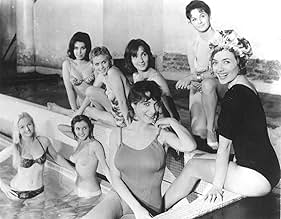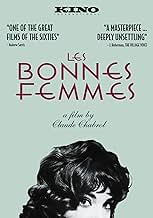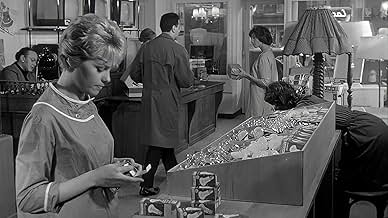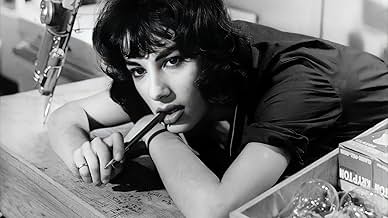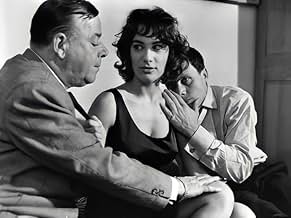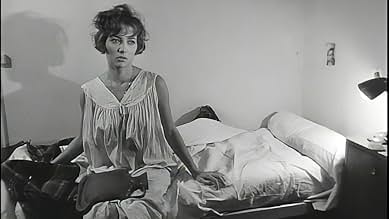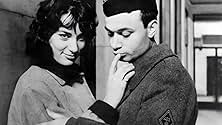VALUTAZIONE IMDb
7,2/10
3329
LA TUA VALUTAZIONE
Aggiungi una trama nella tua linguaFour Parisian women navigate the world of romance and daily life looking to fulfill their dreams but often find real-life to be inescapable.Four Parisian women navigate the world of romance and daily life looking to fulfill their dreams but often find real-life to be inescapable.Four Parisian women navigate the world of romance and daily life looking to fulfill their dreams but often find real-life to be inescapable.
- Regia
- Sceneggiatura
- Star
- Premi
- 1 candidatura in totale
Gabriel Gobin
- Le père d'Henri
- (as Gabriel Gobain)
Recensioni in evidenza
A friend of mine - a film scholar - once said that this film shouldn't work but it does. He was absolutely right. I cannot think of one good reason why this film should be as good as it is. The tone is observational, like many films of the "New Wave," but it lacks the frenetic energy of Godard, or the jaded lyricism of Truffaut. The tone of the film changes drastically at several points, and in any other film this would become a big turn off. But a strand of sincere honesty about the characters and their emotions holds the film together, stronger than any formality.
Let the film take you where it wants you to go, and the experience is wonderful.
Let the film take you where it wants you to go, and the experience is wonderful.
i liked this film. it has an ambigious quality about it, almost paradoxical. it has a feel of a documentary and is observational in nature, yet there is a obvious message or view taken by chabrol and the women in this film. they're doomed objects of desire for men. the women have this elusive quality about them, they're beautiful and somewhat misguided about the men in thier lives. they seem unattainable, yet vulnerable to a ominous unspoken danger that awaits them that is denoted by the music. there's this creepy yet mysterious sounding music that runs through the film when the female characters roam through the streets. and for some reason, all the men in this movie are misogynist jerks! they disrespect these women and believe they're entitled to them. yet, these women flirt with them and passively resist them for most of the film. chabrol lovingly shoots these women and has affection for them, but also sadness at their romantic naivety about the men in their lives that will bring them doom.
Les bonnes femmes (1960), directed by Claude Chabrol, was shown in the U.S. with the title The Good Time Girls. The film depicts the lives of four Parisian shopgirls. (I guess now we would call them retail clerks, but in 1960 they were shopgirls.)
The women are all looking for romance, and they do no one any harm, but their lives are not filled with the glamor and excitement that the term "good time girls" evokes. They go to music halls, public swimming pools, and the zoo. They let men cruising by in cars pick them up. They stay out all night and stumble half asleep into work the next day. One of them is pursued and courted by a mysterious motorcyclist.
All four young women are attractive. Three of them went on to have important careers in the French cinema--Bernadette Lafont , Clotilde Joano, and Stéphane Audran. (Audran later married director Chabrol,)
Although Chabrol is a superb director, and the actors are talented, the film just didn't work for me. The young women had vacant lives, they had no aspirations or dreams of something different, and they had a naiveté that was sad rather than charming.
This is a movie worth seeing if you have a particular interest in the French New Wave, in Claude Chabrol, or in the young actors who were not yet major stars. I wouldn't seek it out as casual viewing. We saw it on VHS, and it worked well on the small screen.
The women are all looking for romance, and they do no one any harm, but their lives are not filled with the glamor and excitement that the term "good time girls" evokes. They go to music halls, public swimming pools, and the zoo. They let men cruising by in cars pick them up. They stay out all night and stumble half asleep into work the next day. One of them is pursued and courted by a mysterious motorcyclist.
All four young women are attractive. Three of them went on to have important careers in the French cinema--Bernadette Lafont , Clotilde Joano, and Stéphane Audran. (Audran later married director Chabrol,)
Although Chabrol is a superb director, and the actors are talented, the film just didn't work for me. The young women had vacant lives, they had no aspirations or dreams of something different, and they had a naiveté that was sad rather than charming.
This is a movie worth seeing if you have a particular interest in the French New Wave, in Claude Chabrol, or in the young actors who were not yet major stars. I wouldn't seek it out as casual viewing. We saw it on VHS, and it worked well on the small screen.
Just to prove that portraying males as all-negative is nothing new, see Les Bonnes Femmes: the employer with wandering hands, the drippy suitor, his bossy Dad, the snobbish fiancé, the lurking psycho, the bad-jokes bully-boy and his fatty hanger-on, the absent lad on national service. Every one of them is no good. And yet the four shop-assistants are no better, they exist only for the men. Whatever the fellows throw at them, they're up for it. It's a chilling worldview, with a cynical twist at the end, (plus a tacked-on coda that seems to be from another movie). Along the way, there's some really hammy acting from the girls' employer that clashes badly with the realistic mood, and some longueurs as the girls get bored at work and we get bored right along with them. The young Bernadette Lafont is a joy, but she fades out in Reel Three when the lovely Clotilde Joano comes to the fore. Whatever happened to Clotilde? Her subsequent career was undistinguished, and she died at age 42. This is mostly a watchable slice of Paris life from the late 50s, although the Algerians who caused so much mayhem only a few years later are nowhere to be seen.
In Paris, Jane (Bernadette Lafont) and her colleague and roommate Jacqueline (Clotilde Joano) are walking home when the friends Marcel (Jean-Louis Maury) and Albert (Albert Dinan) hit on them and invited them to go to a restaurant. Later, Jacqueline goes home while Jane goes to Albert's apartment and has a threesome. On the next morning, they go to the appliance store Maison Belin where they work with Ginette (Stéphane Audran), Rita (Lucile Saint-Simon) and the spinster Mme Louise (Ave Ninchi), who is the cashier. The owner Monsieur Belin (Pierre Bertin) is an abusive boss, and they hate their work. Jane has a boyfriend but is a promiscuous party girl. Ginette has a secret life at night, singing in a music hall. Rita has a bourgeois fiancé, Henri (Sacha Briquet), who does not respect her and believes she is empty. Jacqueline is naive and believes in love, and when a biker follows her everywhere with his motorcycle, she believes he is her shy prince charming. When Jacqueline meets him at a public swimming pool, they introduce themselves to each other and the biker Ernest Lapierre (Mario David) dates her. They go to a remote restaurant in the countryside, and he asks her why she dated him without knowing him. But soon Jacqueline learns who he is.
"Les bonnes femmes" (1960), a.k.a. "The Good Time Girls", is the fourth film by Claude Chabrol disclosing the dull life of four young working-class women in the job at an appliance store. Their moments of joy are after hours, each one with a lifestyle. Jane is a promiscuous woman; Rita does not have self-respect; Ginette likes to sing in a music hall; and Jacqueline, who seems to be the youngest, is a dreamer. In common, they are treated like objects. It is funny to see how silly some men like Marcel and Albert were in those years in Paris. The conclusion is a great surprise from Chabrol. My vote is seven.
Title (Brazil): "Mulheres Fáceis" ("Easy Women")
"Les bonnes femmes" (1960), a.k.a. "The Good Time Girls", is the fourth film by Claude Chabrol disclosing the dull life of four young working-class women in the job at an appliance store. Their moments of joy are after hours, each one with a lifestyle. Jane is a promiscuous woman; Rita does not have self-respect; Ginette likes to sing in a music hall; and Jacqueline, who seems to be the youngest, is a dreamer. In common, they are treated like objects. It is funny to see how silly some men like Marcel and Albert were in those years in Paris. The conclusion is a great surprise from Chabrol. My vote is seven.
Title (Brazil): "Mulheres Fáceis" ("Easy Women")
Lo sapevi?
- QuizCaused so much resentment among the public upon its release that some went as far as breaking seats in theaters as sign of protest.
- BlooperAfter Ernest strangles Jacqueline, he rips his coat out from under her and flips her over. The supposedly dead Jacqueline immediately moves her arm to catch herself from going face first into the mud.
- Citazioni
Monsieur Belin: My pleasure in life is to reprimand little girls... It's my prerogative.
- ConnessioniFeatured in Le fils de Gascogne (1995)
I più visti
Accedi per valutare e creare un elenco di titoli salvati per ottenere consigli personalizzati
- How long is The Good Girls?Powered by Alexa
Dettagli
Botteghino
- Lordo Stati Uniti e Canada
- 6578 USD
- Fine settimana di apertura Stati Uniti e Canada
- 6578 USD
- 15 ago 1999
- Tempo di esecuzione1 ora 40 minuti
- Colore
- Proporzioni
- 1.66 : 1
Contribuisci a questa pagina
Suggerisci una modifica o aggiungi i contenuti mancanti

Divario superiore
By what name was Donne facili (1960) officially released in India in English?
Rispondi
